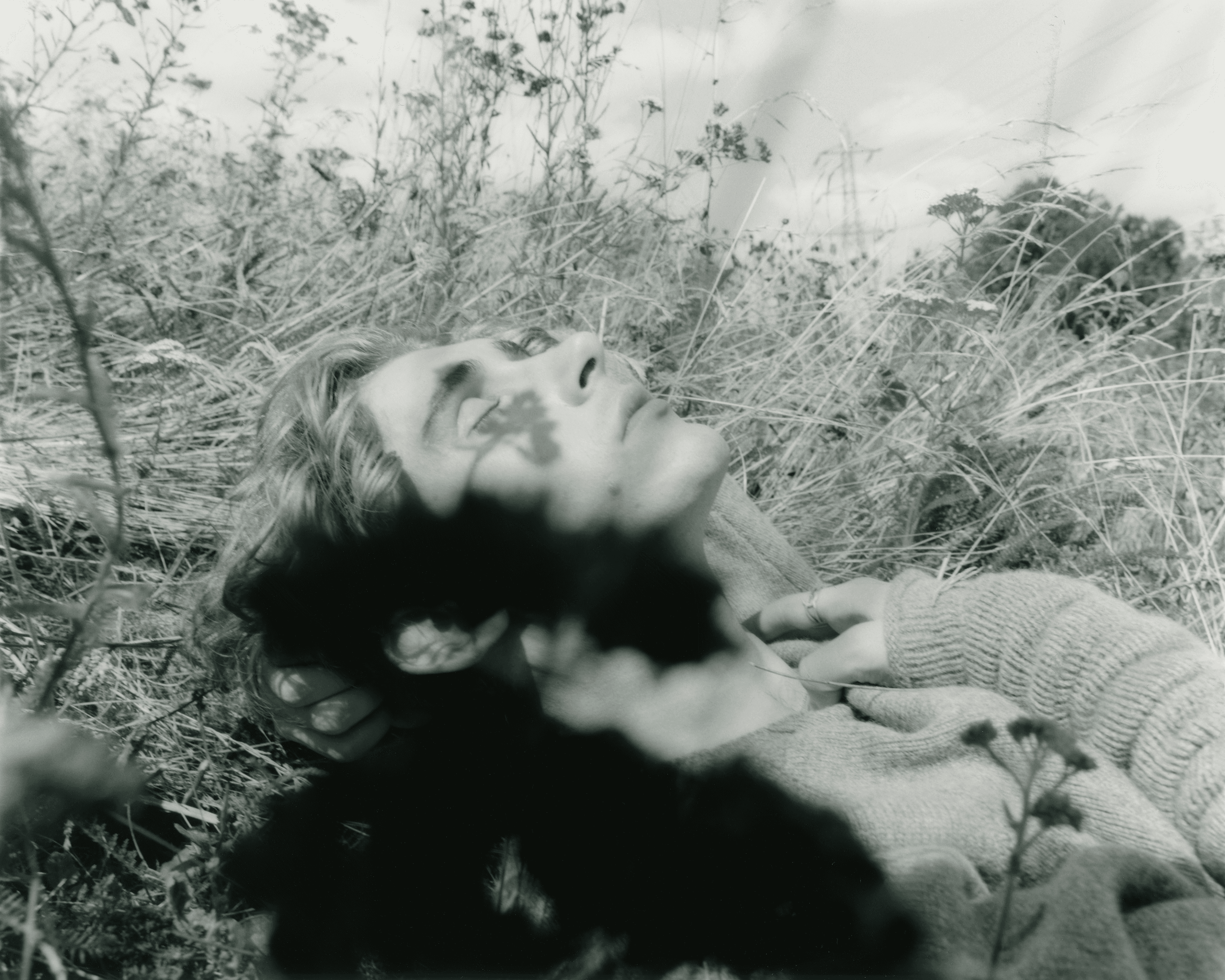
SWEATER by Derrick
Fionn O’Shea Is the Best Boy
The new Netflix series House of Guinness is many things: a period drama, an ensemble showcase, and a fact-based biopic of a family whose name, if not its history, is internationally renowned. Set in the aftermath of the death of Sir Benjamin Lee Guinness, the show chronicles the relationships between the four members of the fourth generation of the iconic brewing dynasty, Arthur IV, Edward, Anne, and Ben, played by the young Irish actor Fionn O’Shea. As the middle son, Ben lacks the charm of Arthur (played by Anthony Boyle) and the acumen of Edward (played by Louis Partridge), and he is dealing with alcohol abuse and depression as he tries to find his own path away from the family business. The 28-year-old O’Shea first came to attention for his sensitive portrayal of a bullied teenager opposite Nicholas Galitzine in 2016’s Handsome Devil, which earned him two Irish Film & Television Award nominations, and was a breakout star of the series Normal People as Marianne’s unbearable boyfriend Jamie. In an exclusive conversation for Cero Magazine, O’Shea speaks with his close friend and Normal People costar Paul Mescal about getting into and out of character, portraying addiction and sobriety, and the importance of positive reinforcement.
Paul Mescal Hey, brother.
Fionn O’Shea Hey, how are you doing?
PM Yeah, good. What’s going on? Why are we talking like this?
FO I know, we’re talking like we weren’t talking half an hour ago.
PM Right, I love the show so much. I think you’re brilliant, brilliant, brilliant in the show. I want to hear first about the audition process. How many rounds were there? What was the headspace within that? Was it something you read and immediately wanted to do straight off the bat?
FO Kind of. The audition process was long, it was three months. But there weren’t that many meetings, there was just a lot of time in between all of them. Honestly, part of the audition process was not going insane in the quiet periods. Also, there were so many people talking about it. I think maybe because we know a lot of Irish actors, it was something that I felt like I couldn’t avoid. The only thing that it’s akin to is the audition process for Normal People, where everyone was talking about something being made.
PM It was like every Irish actor in the world up for it.
FO When I read it, I only had access to the first script, and something that I found really interesting about Ben was that he felt like an alien in that world and in that family and that time.
PM What specifically made you think that?
FO He doesn’t subscribe to any kind of propriety in the way that everyone does at that time, particularly within the family. The way he dresses, the way he communicates, even things like touching his face or the way he picks up a glass or things like that, he’s lost...not all of it, I still wanted to keep parts of etiquette that just would have been ingrained into him from a young age.
PM It’s an interesting junction of somebody who’s railing against the system but needs the system to survive. He wants to refute all of the sense of decent, proper behavior, but also is one of the people who’s the most fucked because he needs that financial support the most. Definitely in the earlier episodes, I was like, “Well, Ben is fucked.”
FO Also I think that the mourning of his father is so complicated for him because it’s less about the absence of a father figure in his life. It’s more the loss of not being able to prove him wrong and then, of course, the financial stability and everything like that. But something I was going to say about reading it was that I felt...you know it’s such an actory thing to be like, “I understood that person immediately.” I didn’t feel like that immediately.
PM So how did that meld into doing it?
FO I think that’s something about [Steven Knight’s] writing that’s so brilliant. As an actor, you have to do the work and you’re challenged by it. As an audience member—and I say this because I love the shows that he’s created—you aren’t spoon-fed everything in a way that I appreciate.
PM Yeah, for sure. I’m interested, as someone who’s also a fan of Steven Knight’s work—it’s got this stylized quality to it. It puts a demand on the actors for a kind of predominant naturalism, but also to be somewhat aware of the tone, to be aware of the style of the filmmaking or the making of the show. Were you, as a group of actors or as individuals, embracing that or leaving that up to your director?
FO I don’t know, it’s funny because a lot of that, I would say we left up to the director. I feel like that was part of how good the casting was too. We didn’t have a huge amount of rehearsal time or anything, and particularly with myself and Emily [Fairn] and Louis [Partridge] and Anthony [Boyle], we immediately felt like a family in those scenes.
PM I remember when you were in Manchester, from a distance, I was aware about how close you had all gotten. It made me so excited that was happening.
FO And that’s something that you can’t really predict until you get there. But in terms of a tone, it really was on the page. Also you’re blessed by having these really long scenes. The scenes are, I would say, mostly around four pages plus.
PM That also was interesting for your character. Especially in the first couple of episodes where you can see the show establishing the setup between Anto and Louis’s character where you feel like the business has to start forming, so it leaves space for your character to jump in and have these longer scenes. I don’t remember lots of scenes with you that were like one-eighth of a page. They’re into the meat of the character and then you go away for a little bit. It’s building this picture of someone behind the scenes, but you’re not seeing a huge amount of him in the first couple of episodes, which I thought was very exciting because it leaves you in a position where there’s probably the greatest curiosity about how he’s going to survive this. I feel like he’s intelligent, but I’m not sure how he’s going to manipulate or use his own social infrastructure to survive.
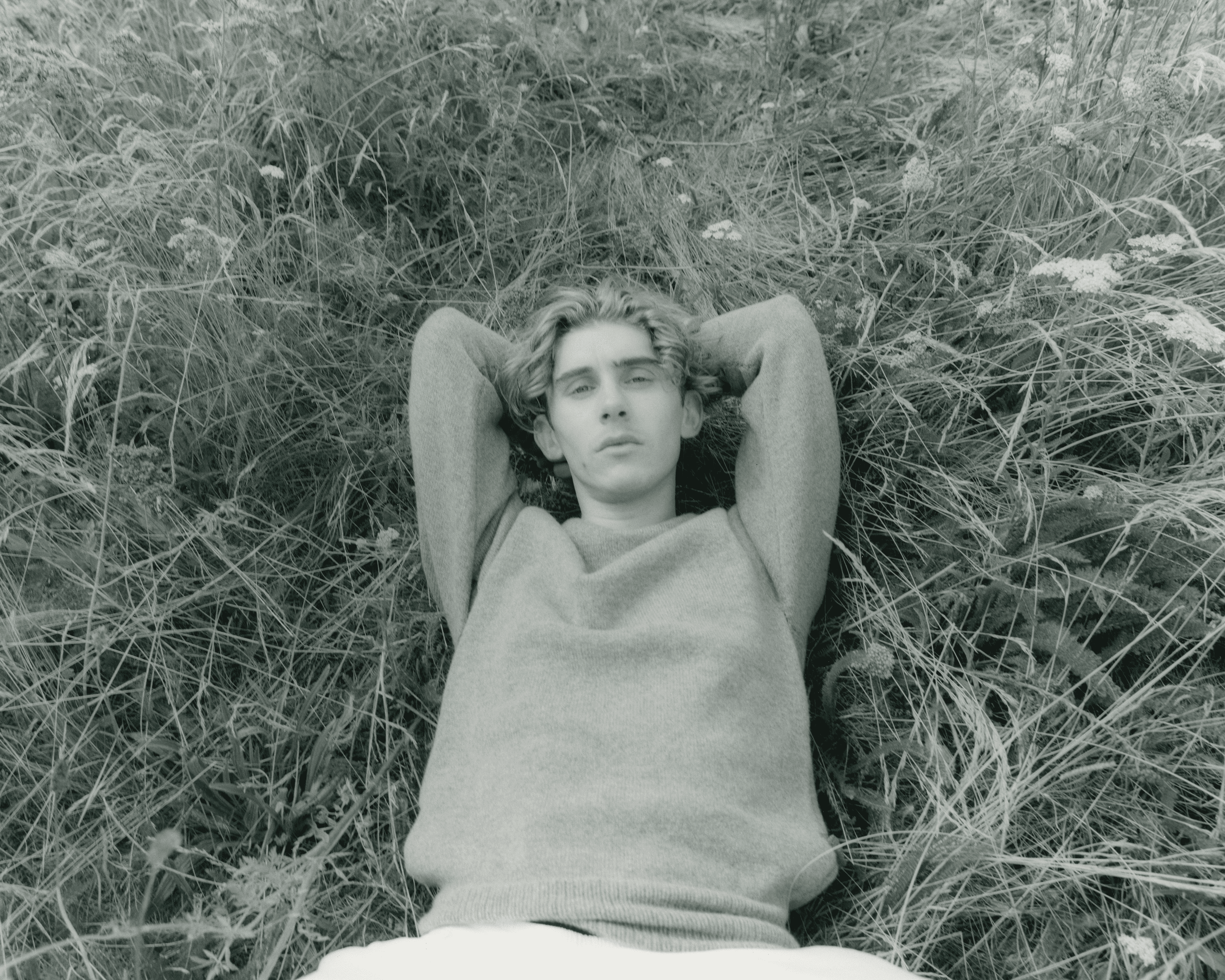
SWEATER by Derrick. SHORTS by Gabriela Coll.
FO And he’s also extraordinarily volatile, both in and out of his sobriety, which I think was interesting to me as well. Also—and those longer scenes give you a chance to show this too—one thing that was really important to me was maintaining hope for that character and that people wouldn’t watch it and see him as this archetype of the drunken brother who just exists in that place. That’s what his family and the people around him are doing to him, but I wanted to always maintain that feeling that you believe that he could get better.
PM I believe that too, but I’m also suspicious about how he’s going to do that, which is exciting as a viewer. There’s something innate in the way that you play him where I’m like, “Oh, this person is a survivor.” It’s a tricky thing that you guys all have to play where these are deeply entitled people. I think it’s always a challenge as an actor. If we were to meet any of the Guinnesses from that time today, we’d be like, we don’t want to hang with them necessarily. [Laughs] But you’ve got to remove that and champion the things that are remarkable about these people, which I admire across the board.
FO Also, particularly at that time too, how aware can you even be of your privilege?
PM Privilege is privilege. You have it or you don’t, and if you have it, you’re probably not aware of it.
FO Even when Ben is asking for money, he asks for a ludicrous amount of money.
PM He thinks that’s fine, that’s appropriate.
FO I guess people who are reading this have probably seen the show, or hopefully have seen the show, but when he asks for money—and this is his lowball—he asks for the equivalent of four hundred grand.
PM [Laughs] That’s the opening offer.
FO His mind is like, “It can only go up from here.” Also, a house in Chelsea. His relationship with money is interesting too because he’s not concerned with power, he’s not particularly ambitious in the same way that his brothers are. Money to him is like a means to an end.
PM Then why is he so upset by the potential lack thereof?
FO Well, I think there’s an element of danger in that because he does have debts to pay. I also think a better way of putting it is, money to him is freedom to not be confined to that family, that house, the brewery, to not be tied to it. I think in an ideal world, he would have got given a huge amount of money and left and done his own thing.
PM Like in the will, been given a million quid or whatever and just fucked off.
FO Well, that’s where it kind of comes in, the privilege thing too, because he feels he’s been so hard done by, but his ambition would probably have been to take the money and not work ever.
PM [Laughs] Oh, for sure.
FO Also, that money would have been spent very quickly.
PM Which kind of ties into my next question, which is, as an actor, trying to find nuance in this dependency on—which I think you’ve done so well—what was your approach to that?
FO Like I was saying earlier, I felt a kinship to Ben, but I didn’t quite understand him at the beginning.
PM Where did that change for you?
FO I’m reticent to go super into detail about that, but I felt that I could definitely identify with some of the feelings of a lack of purpose or feeling disenfranchised or disillusioned, things like that, or where you fit. Because I didn’t understand, I couldn’t stop thinking about it. “I want to be inside that person’s brain and know what he’s thinking.” It was probably the hardest prep that I’ve ever done because it was a lot of spending time in isolation and trying to understand him, lots of reading and writing. I journaled more than I ever had for a job. I kind of lost track of that question. What was it?
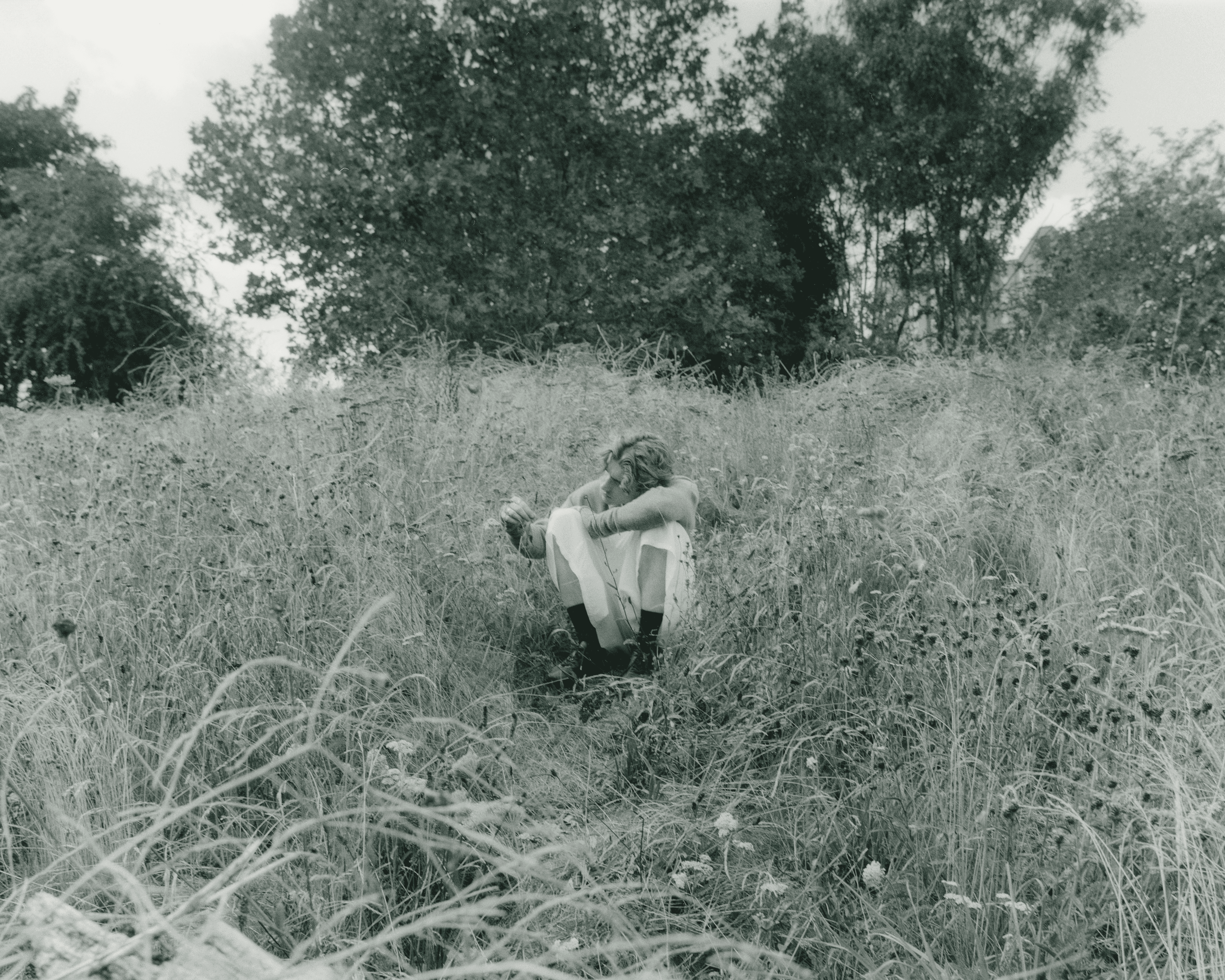
SWEATER by Derrick. SHORTS by Gabriela Coll. BOOTS by Dior.
PM What was the access point to him maybe is a better question.
FO There was something that I read that was weirdly a turning point for it. I was reading Colin Barrett’s novel Wild Houses and there’s this guy who’s reclusive and there’s this whole passage about when he was bullied at school and how the bullies moved on and didn’t bully him anymore and he felt that absence. The attention was something and now he was just kind of a ghost in the corridors of the school and all of his thoughts were unarticulated. That made a massive difference for me for Ben, into right before where we meet him now. He’s gone past the point of the attention being on him being such a fuck up and past the point of people helping him. Even in that opening scene, the family move around him where he’s asleep on the couch. He gets up, first thing he does is have a drink. He’s getting no attention.
PM Because also they’ve developed a habit with him. They’ve assumed a certain quality to his character, I would say.
FO Exactly, I was doing all of this work and I felt like everything was piecing together and then that was filling a void that was there. Also on a physical level, the further I was getting into the prep, the less I was looking like what I’m used to looking like. You can attest to how insufferable I was.
PM The mustache. [Laughs]
FO There was something really helpful with that.
PM There was something definitely physically, but as your friend, the detail to which we would be privy to the level of mustache growth, the quality of it, was pretty consistent, I would say. [Laughs]
FO [Laughs] It was worth it.
PM I’m also curious—there’s essentially four protagonists or four members of the family that have been directly impacted by what’s happened with your father dying, would you say that you have a specific working relationship with each of them or that it felt familial across the board? Was there a specific working approach that you did to delineate those relationships or is that just a day-to-day playing it out?
FO Again, I think because we had rehearsal time, we got to rehearse a large portion, particularly in the first block of those bigger scenes with the family, which meant all of those conversations were already happening individually and collectively by the time we got there, which meant that there was just a shorthand with everyone with those ideas.
PM How long did you spend up there rehearsing?
FO We had, I think, about two weeks. Not a huge amount of time, but then also that’s two weeks in a place that none of us are from, so there was so much time spent together. Those conversations in work then naturally start permeating into your conversations that evening when you’re hanging out. I think there was a lot of work that we tried to do. Particularly with Arthur [played by Boyle] and Ben, there were a lot of conversations about what their relationship would have looked like as kids. Arthur treats Ben horrifically badly. Even the first time we meet him, he pours whiskey in his face and then slaps his hand. With that, Anto and I had a lot of conversations about how to bring more of that into the show so it felt more present in it too. Particularly because in the first two episodes, there’s so much happening and there’s so much to establish in those dynamics, I think that’s what was really also so nice about having time with that stuff, where you have time to talk about that and have an idea and it’s not like you’ve got one take and then you’re moving on and then that night you’re like, “Oh, I wish I pitched this thing.”
PM I’ve only seen the first four episodes, but were there any particular moments like a day on the call sheet that you’re like, “Oh, that’s the day, that’s a big scene”? How did you approach them?
FO I think probably that scene in episode one where he asks Christine to go and get a gun and she comes in.
PM It’s an amazing scene.
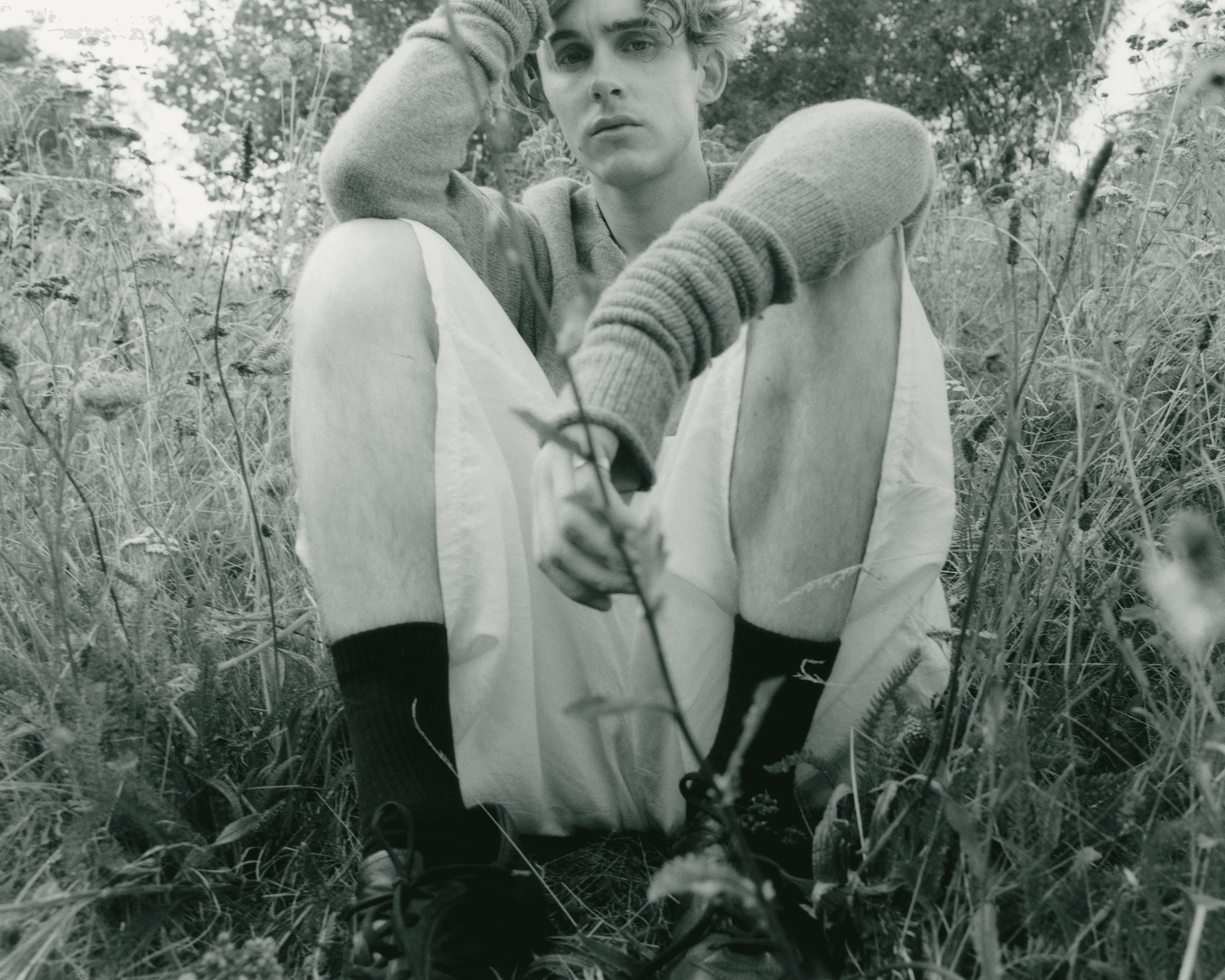
SWEATER by Derrick. SHORTS by Gabriela Coll. BOOTS by Dior.
FO Oh, thank you. Well, that was the first day, so that was...
PM That was your first day?
FO Yeah, the first day, so that was the first thing we shot.
PM What a horrendous thing to schedule on the first fucking day.
FO It was so terrifying, but weirdly, I actually was really grateful that we did that because it meant I had put something down and committed something that I felt good about and that said so much about Ben. Sometimes, if your first week is all one-eighths of a page and it’s you walking and then you’re like, “I can’t believe I fucking did that walk,” and you’re like, “Now I have to do that walk the whole time.” [Laughs]
PM [Laughs] Oh man, fuck that, fuck that. I think that’s all the more impressive that that scene was the first shoot day.
FO I think also, there’s so much to cover and it’s such a complicated scene too. It was horrific scheduling, it was terrifying scheduling.
PM But it’s also the nature of the beast, isn’t it, that kind of stuff? A schedule is never the way that you want it to be, ever. I’ve never experienced that where it’s how you want it to go.
FO No, not at all. Then the second thing I shot was walking down the street. So that actually was the order of the events.
PM Did you shoot anything in Dublin?
FO No, we didn’t shoot anything in Dublin. We shot in Manchester and Liverpool.
PM How did [director Tom Shankland] work? I imagine it was pretty tight to script.
FO It was, but Steven’s writing is just so brilliant that it’d be rare that you’d want to change anything. I’m so impressed by Tom and his ability to spin so many plates at the same time. To spin so many plates, but also to be able to give everyone the attention that they require. And obviously different actors require different things, different departments require different things from him.
PM What do you think you required from him?
FO Positive reinforcement, probably. [Laughs]
PM [Laughs] Any actor who doesn’t say that’s probably fucking lying.
FO Yeah, of course.
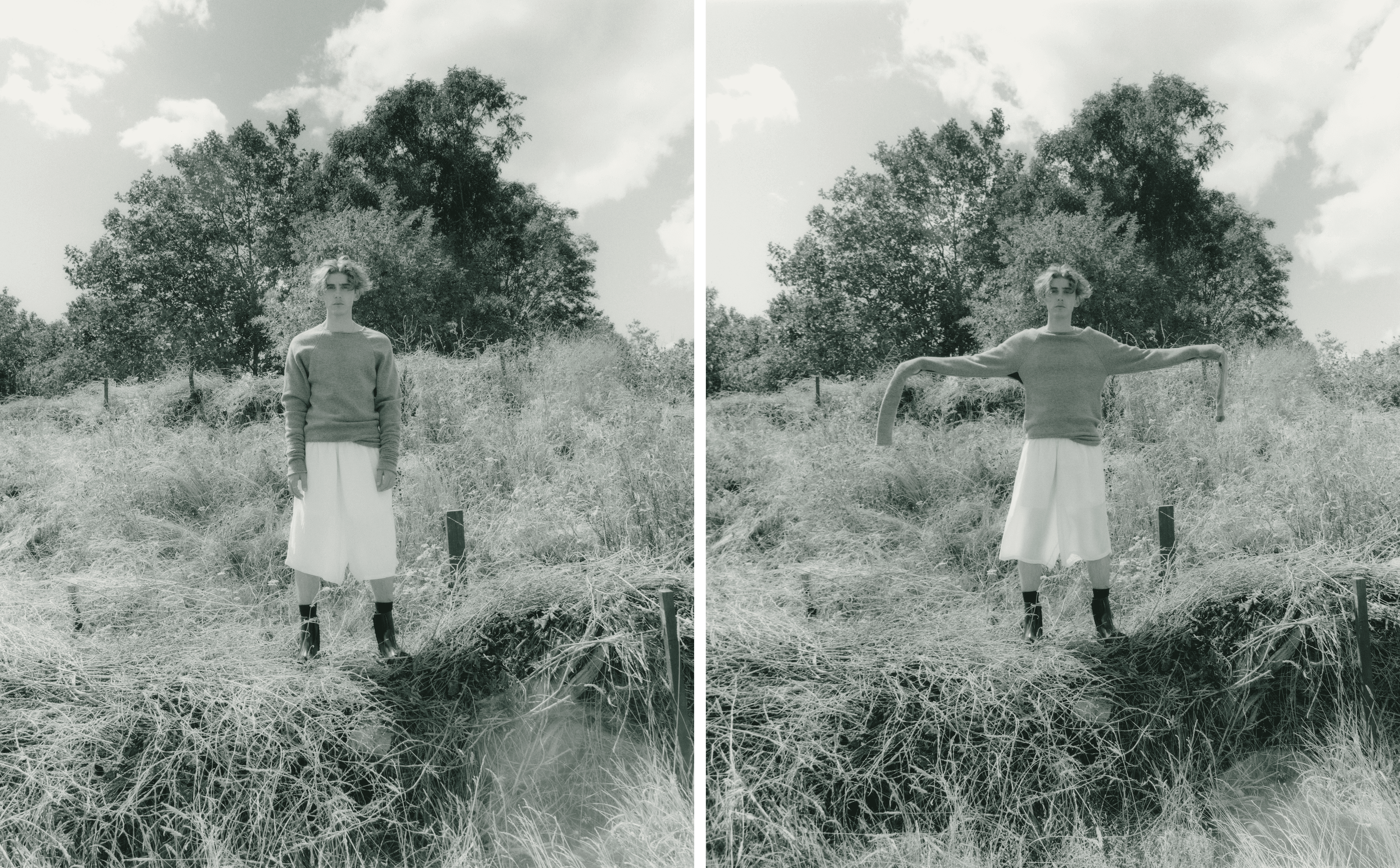
SWEATER by Derrick. SHORTS by Gabriela Coll. BOOTS by Dior.
PM [Laughs] “Tell me I’m the best boy.”
FO “Tell me I’m the best boy.” [Laughs] Honestly, one thing that was great was that myself and Tom and Mounia [Akl], who directed the second block, we all had the same vision for where we wanted Ben to go as well. With writing like that, there’s so many different ways for that to be.
PM Especially in that format, you’ve got time.
FO And that was completely new. Well, new in a way, new, I would say, in a way that Ben goes through so much change, even in the first four that you’ve seen.
PM Jamie’s different in the sense that Jamie’s a massive feature in Normal People, but it’s different, he’s a catalyst for a period in Marianne’s life and this is a different thing where it’s a different focus.
FO And there’s no attempt at self-growth for Jamie either.
PM Famously not.
FO [Laughs] Because he’s fully formed, he’s perfect.
PM [Laughs] He’s perfect, he’s the best boy.
FO He’s the best boy.
PM He’s the classic example of someone who’s been told that he’s the best boy too many times in his life.
FO Oh, one hundred percent, yeah. That was a different thing, too. The bit that’s similar is you’re working with exceptional writing in both, which makes your job so much easier.
PM Sometimes it’s not so good because it can give you the pressure to deliver in a way that you can’t hide behind.
FO That was something that I really appreciated actually in the way Tom directs. You never feel that he doesn’t have absolute control and clarity in his vision. But he also is available to you all the time. So if I want to go up and say, “Am I the best boy?”
PM You better believe it! Fionn, you are the best boy with the best mustache.
FO Oh, that’s amazing. Can we clip that actually from the tape?
PM [Laughs] You can have it projected on the roof of your bedroom. So you shot it for six months, seven months?
FO Six months, yeah
PM Putting it to bed is a big thing, I imagine.
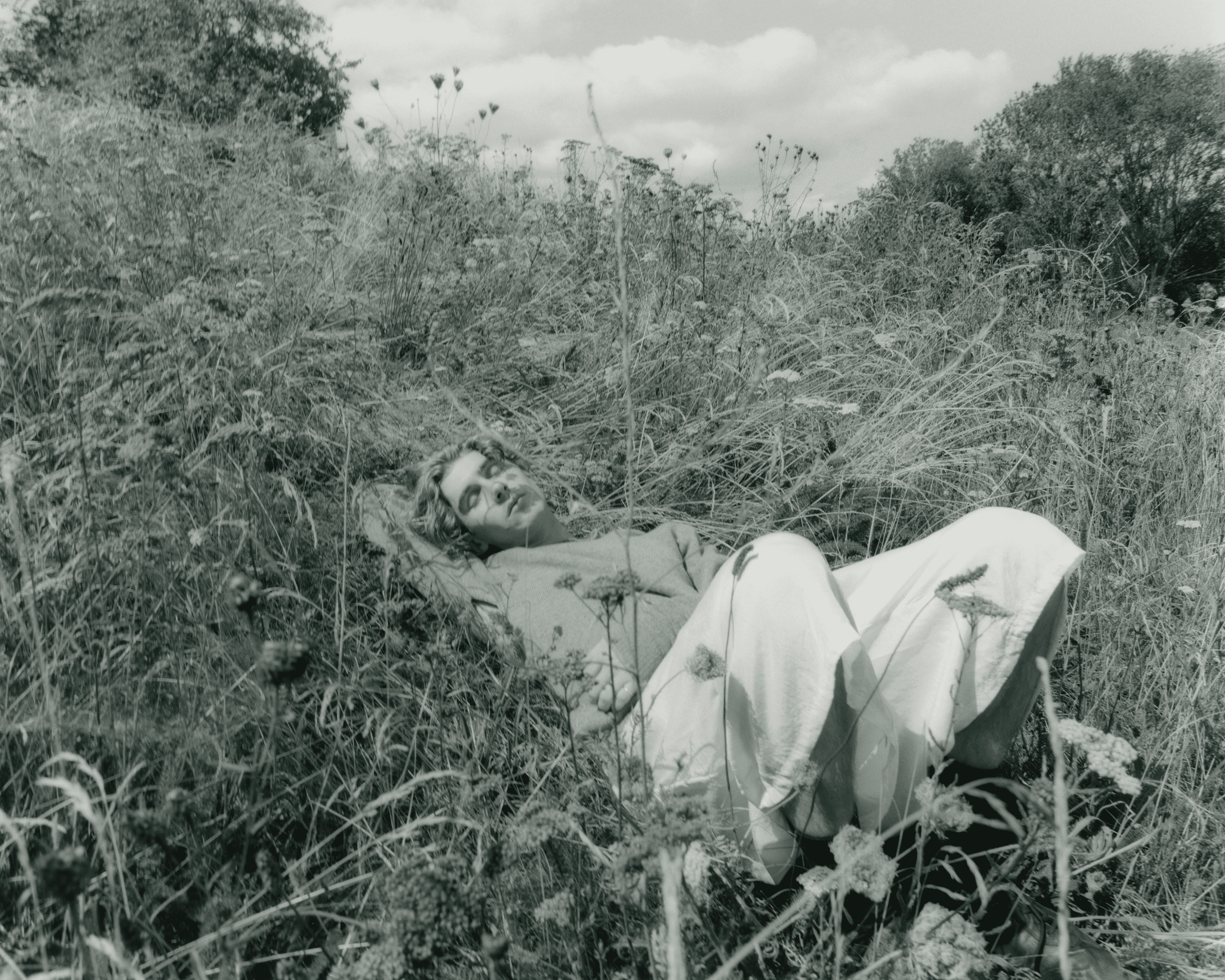
SWEATER by Derrick. SHORTS by Gabriela Coll. BOOTS by Dior.
FO Yeah, we’ve spoken about this before, but there’s so many conversations about how you get into character and it’s a lot more rare that people ask you about letting go of something and moving on from it. I think that often people will ask about how you process something day to day, like a big scene day to day, and that’s definitely part of it. For me, I think that the process of letting go of it entirely once you’ve finished is far more difficult.
PM It’s also loaded, you don’t know whether it’s the relationship you have with the people that you’re working with, the art itself, the security of having a job. I find it impossible to delineate what the actual feeling is or what I’m actually letting go of. Then oftentimes there’s a relief that the pressure is off.
FO There’s also just no roadmap for it either. You try different versions like “Oh, I’ll finish this job and I’ll spend a week alone,” or “I’ll finish this and I’ll go on holiday,” or “I’ll be around people,” and then you try every version and you’re like, “I’m still sad.” I’m still sad after every job.
PM “Nobody’s telling me I’m the best boy anymore. Fuck.”
FO [Laughs] I know.
PM Maybe that’s the key. Maybe moving forward, when you finish a job, I’ll just pop around every day and just be like, “Fionn, remember, you’re the best boy.”
FO [Laughs] I feel like I really needed that today, thank you.
PM It is tough. It is actually tough, that feeling of separation.
FO This is the conversation we had before where it kind of feels like a breakup in a weird way.
PM And you’re not breaking up with anyone. They’re all still my friends, hopefully—and if they’re not, then there’s a relief that you’re like, “OK, I don’t have to hang out with this person anymore.” Actually, there’s no version of it where that’s not true, but you’re right, it is this weird breakup where it’s like, “But I don’t know what I’m breaking up with.”
FO Then even with the character, if you broke up with a partner, your friends would put up with you talking about it, but if I, months after I finished the show, was like, “I was thinking about the show...”
PM “I just miss him, man. I miss Benjamin.”
FO [Laughs] I don’t know if you feel like this, but I think as you get older too, towards the end of a production, you have a much better idea of how people exist in your life going on from the production.
PM Totally, you know from the first couple of days on set or in rehearsals where you’re like, “Oh, this is a work friend, or this is a friend for life.”
FO Yes, absolutely.
PM It’s a relief to make that distinction, I think.
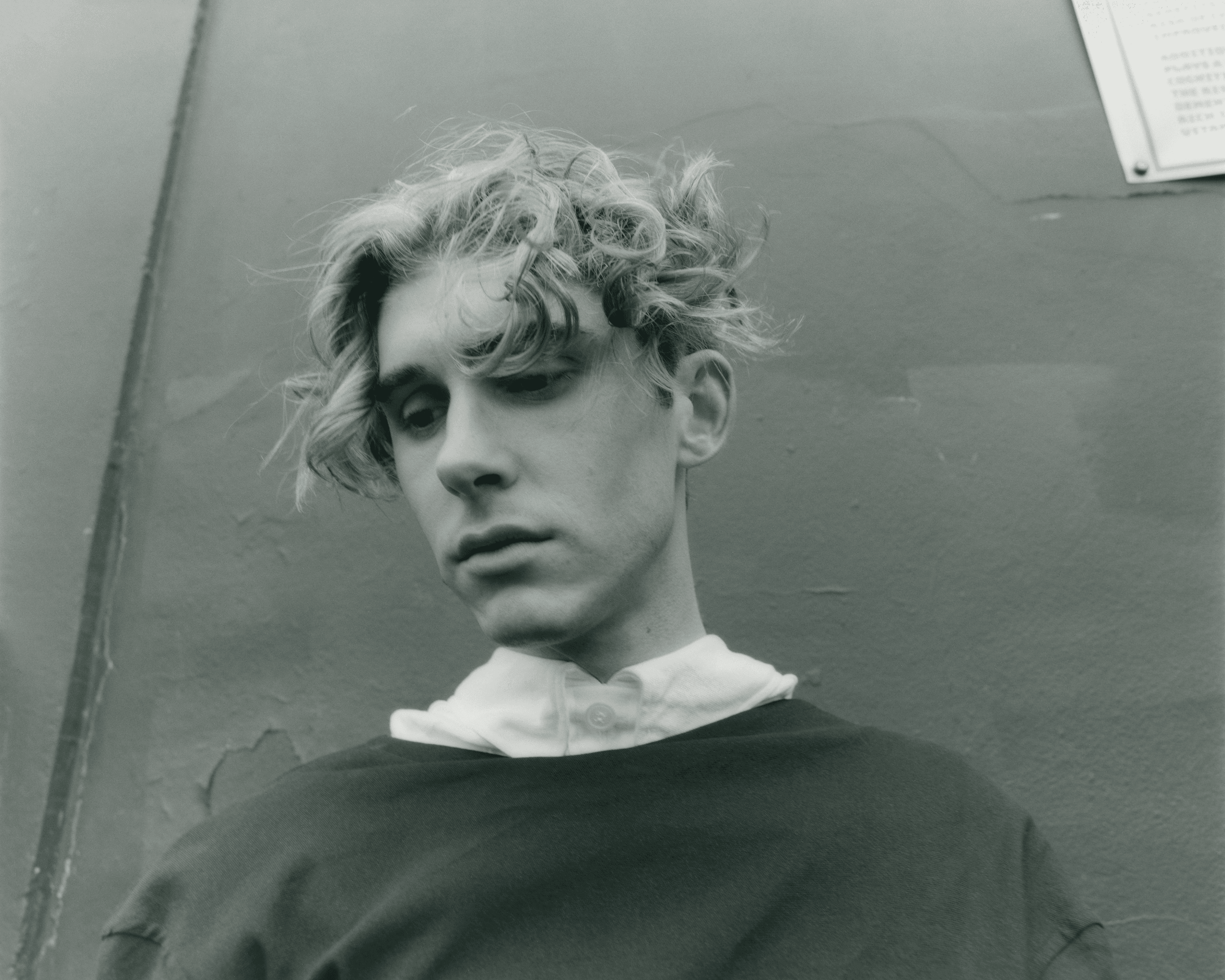
All CLOTHING by Issey Miyake
FO For sure, but then also once you finish the job, it’s the after bit that’s difficult to maintain and the true test of whether or not you’re going be able to do it.
PM Yeah, I agree. What were the corners of playing Benjamin that made you most uncomfortable or that you were like, “Oh, I don’t know if I’ll be able to do that”?
FO The “I don’t know if I’ll be able to do this” was probably the first thought I had every morning waking up when I was in prep. Because I was still trying to find who he was, or find who he was to me. Weirdly, the scenes that felt more daunting to me on paper were the scenes where he was sober. Because I had such a good understanding at that point of what it looks like, how he navigates the world while he’s in the worst parts of his addiction, the scenes where he was sober…you know the way sometimes in your mind you’re mixing up “Am I feeling this because I think this?” or “Am I feeling this because this is how he feels in this situation?”
PM I think that’s something that he’s probably wrestling with.
FO That’s what I mean. He’s in those rooms sober, being like, “Who am I in these rooms now? Who am I without this thing in my life anymore?” I then was having a similar thing of like, “Who is he in these rooms?” That was interesting, but I also loved playing those scenes because it’s so different and really important. Also, you see that he has the ability to be a shark.
PM That was one of my favorite things. When you go to your mother and you ask for the money, that was the moment where I was like, “Oh, this person is infinitely more interesting to me than somebody who feels like they’re entitled to something in a will. This is somebody who’s pissed off and rallying really quickly to figure out a way to survive.”
FO Also, I think you believe that he could have been a part of that brewing business.
PM I also think that there’s a ruthlessness to that. Because he’s not motivated by traditional success, there’s something more frightening about him to me where I’m like, “Oh, what’s he want? What’s the motivating factor for him?”
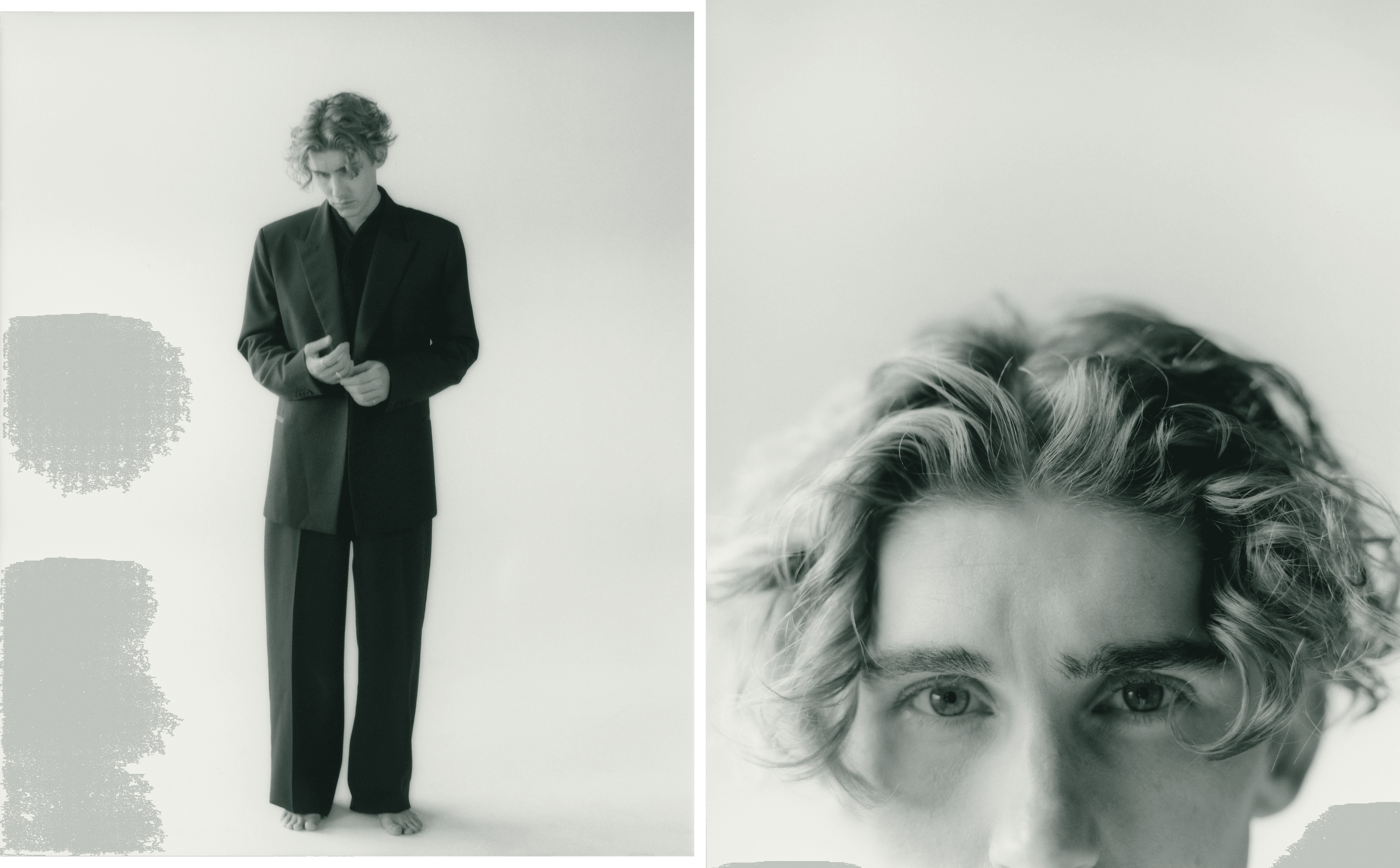
All CLOTHING by Dior
FO Something that was interesting to me, which I think is such a big part of Ben, is that he’s constantly running away and trying to escape what he thinks is making him unhappy. But then at a certain point as it goes on, he’s confronted with the fact that he has no idea what makes him happy and he’s exhausted every avenue. He’s stopped drinking and he’s stopped doing drugs, he’s stopped gambling, he’s gotten a job, he’s got money, he’s got a wife. He’s got all of these things, and he’s still deeply unhappy. I think that’s probably where he’s at his most dangerous.
PM Is there anything else you want to talk about in terms of approach? Anything that I haven’t asked, and also is there stuff that you would rather talk about?
FO I don’t think so. I think we’ve covered a lot of bases. We’ve said, “best boy,” enough.
PM I think we should say that a couple more times, honestly. Honestly, Fionn, I do think you are the best boy in this show. You’re the best boy for me. But I do want to say, I think you are extraordinary in the show. I think the group of the four of you are so compelling, and I really hope people go out and watch the show because I think the character study is so interesting. I think people who are fans of your work, they’re seeing you stretch muscles that I’ve never seen you stretch before, but just as a piece of television, I think it’s entertaining and really well-acted.
FO Well, thank you. Also, maybe if there was something else which I do want to say is how extraordinary Anto and Emily and Louis are. Particularly, as we know, Irish accents can be difficult.
PM Yeah, they’ve done a fucking good job.
FO Em and Louis are so fucking fantastic and were from the moment we started. Really, I just want to say that they’re the best boys.
PM Yeah, they’re the best boys of the Irish accent challenge.
FO [Laughs] But they are extraordinarily good.
PM They’re also doing a specific version of it, which is kind of anglicized, and it’s brilliant. It’s really detailed and clever.
FO Watching the show, that’s what was so exciting. I just think they’re all so brilliant, which also makes those scenes so exciting to do as well. You get to the end of it and you feel like you’ve achieved something together and you feel like everyone is bringing something so different, which is cool. I’m trying to think, have I done something with that many long scenes? Honestly, the only thing I can equate it to is the dinner table scene in Normal People.
PM Big long day, yeah.
FO Yeah, except in these, I’m not housing a kilo of pasta in every take. But no, I think we’ve covered it. Thank you so much for doing this.
PM Not at all, do it again in a heartbeat.
FO I thought you said in an hour. [Laughs]
PM [Laughs] I’d do it again in an hour. You’re the best boy.
FO I think you’re the best boy.
PM No, we’re the best boys.
Be the first to read this story and many more in print by preordering our tenth issue here.
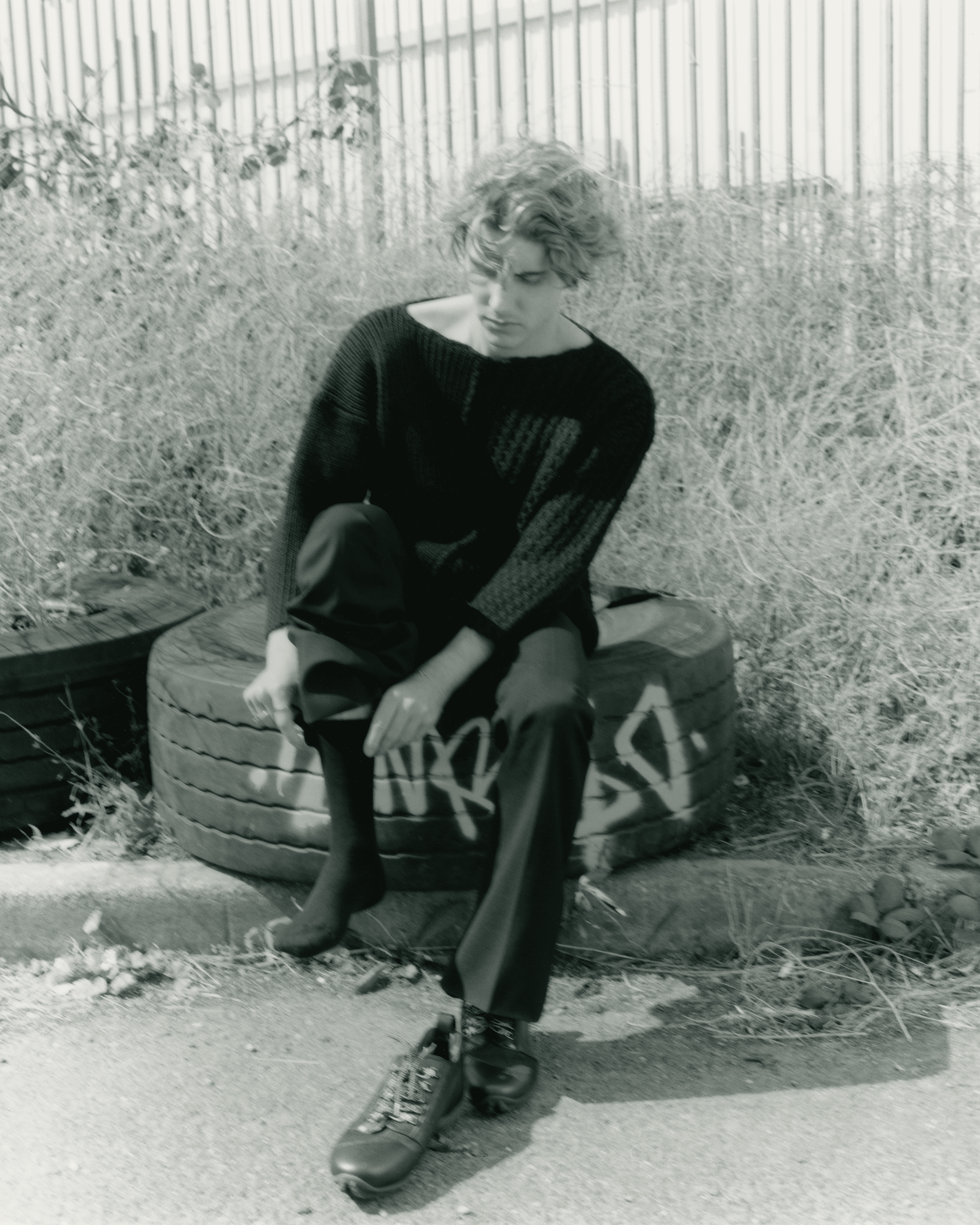
Vintage SWEATER from Little Brownings. PANTS by McQueen. SOCKS by Pantherella. SHOES, stylist’s own.
As a nonprofit arts and culture publication dedicated to educating, inspiring, and uplifting creatives, Cero Magazine depends on your donations to create stories like these. Please support our work here.






